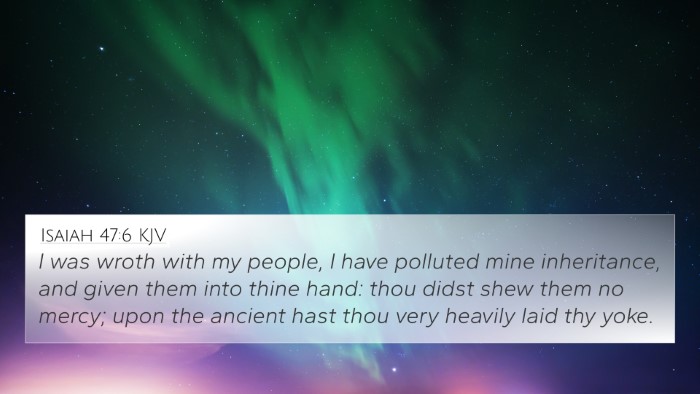Understanding Joshua 9:25
Bible Verse: Joshua 9:25
"And now, behold, we are in thine hand: as it seemeth good and right unto thee to do unto us, do."
Summary of Meaning
This verse occurs in the context of the Gibeonites' interaction with the Israelites after having deceived them to secure peace. The Gibeonites, facing the consequences of their actions, express their submission and dependence on the Israelites for their fate. This statement serves as a significant moment, illustrating themes of mercy, humility, and the acknowledgment of one's position in relation to God's chosen people.
Commentary Insights
Matthew Henry's Commentary
Henry emphasizes the desperate state of the Gibeonites, who recognized that they had no strength of their own and thus looked to the Israelites for mercy. Their plea represents a profound understanding of their situation, showing the importance of humility before God's people. Henry also notes that their request is an appeal to the justice and righteousness of Israel, aligning their fate with the leaders they had deceived.
Albert Barnes' Notes
Barnes highlights the theological implications of the Gibeonites' statement. It illustrates the sovereign power of Israel and serves as a reminder that sometimes God's people must be the bearers of mercy. Their words indicate a form of surrender, emphasizing the desire for welfare rather than destruction. The verse underlines the results of their covenant with Israel and their acceptance of whatever outcome Israel chooses for them.
Adam Clarke's Commentary
Clarke discusses the Gibeonites' recognition of their precarious standing. Their words convey a deep respect for the authority of the Israelites. Clarke suggests that this moment is critical for understanding how interrelationship dynamics unfold in Biblical narratives, reinforcing themes of reliance on God’s people for protection and favor. He also connects this request to broader narratives of divine judgment and protection extended to those who seek refuge among God's people.
Connections to Other Bible Verses
Joshua 9:25 shares thematic similarities with several other Bible verses that highlight themes of humility, mercy, and dependence on God's people. Here are some notable cross-references:
- 2 Samuel 16:4 - Ziba's servitude to Mephibosheth illustrates themes of dependence on those in authority.
- Esther 8:5 - Esther's appeal to the king shows the importance of mercy when appealing to authority.
- Proverbs 16:7 - When a man's ways please the Lord, he makes even his enemies to be at peace with him, reflecting the Gibeonites' plea for peace.
- James 4:10 - "Humble yourselves before the Lord, and he will lift you up," emphasizing the need for humility.
- Matthew 5:7 - "Blessed are the merciful, for they shall obtain mercy," linking the theme of mercy directly to the treatment of the Gibeonites.
- Luke 18:13 - The tax collector's plea for mercy resonates with the Gibeonites' request.
- Romans 12:18 - "If it is possible, as far as it depends on you, live at peace with everyone," reflecting the situation faced by the Gibeonites.
- Micah 6:8 - Seeking justice, loving mercy, and walking humbly with God complements the themes of this verse.
- Philippians 2:15 - Shining as lights in the world, which applies to the Gibeonites seeking peace and favor.
- Jeremiah 29:7 - Seeking the welfare of the city wherein you dwell illustrates the interdependence of populations, much like the Gibeonites and Israelites.
Thematic Connections and Interpretations
This verse serves as a poignant reminder of the complexities in human relationships, notably in how we relate to authority and seek mercy. It invites deep reflection on the implications of our actions and the need for humility. Understanding Joshua 9:25 through the lenses of different biblical texts enhances our comprehension of God's workings through humanity and the importance of mercy.
Conclusion
In conclusion, Joshua 9:25 encapsulates profound themes of surrender, mercy, and reliance on God’s people amidst the complexities of sin and deception. The cross-references to related scriptures deepen the understanding of how these themes resonate throughout the Bible, highlighting the interconnectedness of its teachings.











